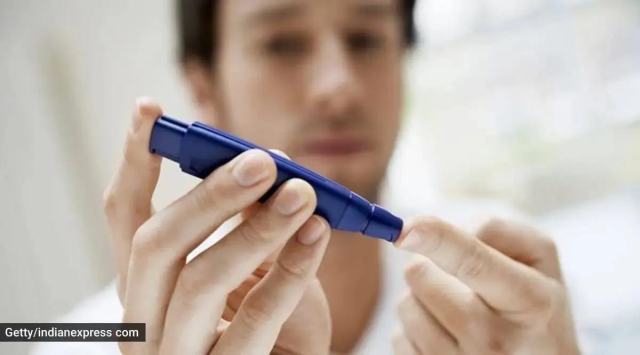
The problem with Indians is taste buds but you can get habituated to low/no sugar content, says Dr Tejas Limaye, clinical nutritionist and certified diabetes educator. “Cut down sugar added in milk/tea/coffee. This will drastically reduce daily sugar consumption. Prefer plain water when thirsty over juices/sweetened beverages. Instead of refined, synthetic sweets, go for fresh or dry fruits. Try to sense the sweetness hidden in every food by consuming it peacefully and chewing it well (all grains taste sweet when chewed thoroughly),” she adds. According to reports, the per capita consumption of sugar and sweets is increasing steadily in India. Parallel to this rise, the prevalence of obesity, type 2 diabetes and heart disease is also on the increase, Dr Tejas says and appeals that almost every food is converted to sugar at the end of digestion, hence simple sugar is not really needed.
Story continues below this ad
Many of us have a tendency to eat something sweet after every meal. Indian sweets, chocolates, synthetic juices, soft drinks and biscuits contain high concentrations of sugar. “Sugar provides empty calories (calories without any nutrition). One gram of sugar yields 4 kcal. The need then is to include healthy eating habits from early childhood. Read food labels carefully to detect the hidden sugar in packaged foods. Avoid foods high in sugar (if a food contains more than 15 grams sugar per 100 grams of food). Again, foods where sugar is listed in the first three ingredients are a no-no,” Dr Tejas cautions.
Sugar, jaggery, and honey are not very different. Replacing one with another gives no extraordinary benefits, experts say as in the end they all are glucose for the body. Also use of natural sweeteners — fruit purees /dry fruits/ licoricej — is advised . Chemical sweeteners (sugar-free) can be used in consultation with doctors and nutritionists.
Dr V Mohan, noted diabetologist and Chairman, Dr Mohan’s Diabetes Specialities Centre, Chennai, says sugar is bad not only for diabetes but has a host of other comorbidities associated with it. “To start with, dental caries in children are directly linked to sugar intake. Sugar also contributes to increased triglyceride levels (lipid abnormalities), obesity and thereby to hypertension and Type 2 diabetes. It is also not safe for the heart. There is some indirect evidence that excessive sugar intake may be related to fatty liver and some forms of cancer as well,” adds Dr Mohan.
“One cannot definitely say that by just eating sugar one will get diabetes as a genetic predisposition might also need to be factored in. There is no doubt though that if one is in a pre-diabetic stage, excessive intake can push you into the diabetic stage. While the commonest cause of uncontrolled diabetes is the intake of sugar in the diet, conversely, if that sugar intake is cut down, it helps to control diabetes well, reduce weight and produce a remission of diabetes known as reversal of diabetes,” Dr Mohan adds.
Story continues below this ad
On sugar substitutes, Dr Mohan says there are different types of sweeteners – the nutritive ones that contain fructose actually defeat the purpose of switching over from sugar. The non-nutritive sweeteners are calorie and sugar-free (like stevia) and hence can be taken by people with diabetes. “Still there is fear among the public that consuming alternative sweeteners can lead to deleterious health, including cancer. This is not true and has not been conclusively shown that such sweeteners are harmful to health and can be consumed in limited quantities,” the expert says. Dr Mohan admits it may not be possible to completely eliminate sugar but makes a strong case about the adage, the less the better, being very pertinent as far sugar is concerned. “The next time you reach out for sugary sweets and beverages, pause and ask yourself whether there is a healthier alternative like fruits,” he says.
Maitreyi Bokil, exercise physiologist and sports nutritionist points out that feeding your brain refined sugar is like a rave party in the brain. “Repeated behaviour causes not only insulin resistance but reduced food related satiety (till eventually you eat the sweet),” she says.
On why there are sugar cravings, Bokil explains, “The brain is ‘bored’ of the usual food and wants something exciting. Therefore, sugar is exciting for the brain. Often during stressful times (be it deadlines, conflict situations or traffic chaos) the brain needs reassurance of safety. Sugar is release for the brain at such times.”
So how does one battle the urge of stress-eating? “Other things can also be calming and reassuring: Go out for a small walk and breathe fresh air, do a light exercise or yoga routine, drink a non-caffeinated drink like chamomile or lemon tea,” she advises. The nutritionist also adds there may not be time for a thorough mouth rinse post-meals as food vapours travel to the brain prompting a change of taste. “One of the solutions for changing the taste in your mouth could be to rinse with a mouthwash or chew on a natural mouth freshener like home-roasted saunf and flaxseeds,” Bokil says.
Story continues below this ad
The ideal solution for Indians habituated to presenting sweets at all festivals and major functions is to replace them with alternatives like gifting healthy nuts. Experts also emphasise the need for collective efforts from all stakeholders (government, policy makers, food manufacturers, media, schools, consumers) to cut down on sugar intake.

































